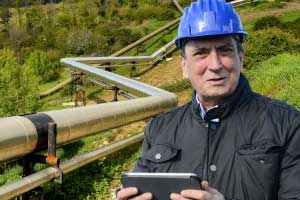Disclaimer: The information on our website is provided for general information purposes only. We make no representations or warranties of any kind, express or implied, about the completeness, accuracy, reliability, suitability or availability with respect to the website or the information contained on our website for any purpose. Any reliance on such information is therefore strictly at your own risk and we are not liable for any damages or losses arising out of or resulting from your reliance on any information contained on our website.
A geothermal technician works at locations that generate energy from geothermal sources. They have an important role to play as they monitor gauges and controls to ensure the machinery is working properly. These technicians also inspect, maintain, and repair equipment as necessary to ensure it stays in good working order. They may have additional titles such as maintenance technician, operator technician, or plant technician.
How to Become a Geothermal Technician

According to O*NET OnLine, an associate’s degree or bachelor’s degree is not required to gain employment as a geothermal technician. In fact, a little over 50% of the techs surveyed held a high school diploma and a little over 30% had earned a certification after graduation. Under 10% had taken some college classes. You can expect to receive on-the-job training which may take up to 1 year. During your training, you would learn safety procedures, the equipment you will be working with, and how to inspect, maintain, and repair it.
If you need to gain a competitive edge over other applicants, training in Heating, Ventilation, and Air Conditioning (HVAC) may be helpful. HVAC training would teach concepts and technical skills that may apply to your role as a geothermal technician.
Job Description of a Geothermal Technician
A geothermal technician works with the geothermal equipment associated at a plant and ensures it’s operational. They will monitor the readings of the equipment and make necessary adjustments to meet their location’s distribution needs. These technicians are also responsible to inspect and maintain the equipment and can perform repairs. Knowing the sites safety procedures and preventing accidents by wearing the appropriate safety gear is vital.
If there is an emergency, these techs will know how to react quickly. If equipment becomes outdated and may become hazardous, they would recommend when new equipment should be replaced. Along with being hands-on with the equipment, technicians must also log the work they preform and run any necessary reports. Due to the variations in systems they must also have an understanding of geothermal technology, heat transfer, and electrical systems to ensure appropriate operations of the equipment they are working on.
At times they may also interact with clients or organizations on the use of the equipment in addition to safety procedures and optimal equipment performance. Geothermal technicians work in a variety of environments and are often in the field. They may travel to sites were they conducting repairs, maintenance checks, or installations which can be physically demanding, however they can also work indoors for example when fabricating or testing equipment prior to installation or when collaborating or doing administrative work for clients. Some benefits in becoming a Geothermal are it is a hands on job, they are in constant communication, and get instant gratification in seeing results in their work. In addition there are good job prospects and they receive health, vision, and dental insurance. They also receive paid sick days, vacation time, and retirement options
Geothermal Technician Career Video Transcript
Geothermal technicians help ensure that geothermal energy resources power-up plants and buildings around the clock. They monitor gauges and dials on equipment and perform maintenance and repairs. They also keep logs and write reports on energy production and the work they perform. In residences and commercial buildings, technicians may install geothermal heat pumps and perform tests to ensure they run properly.
Many technicians work outdoors in all kinds of weather conditions. They may operate excavation equipment such as backhoes, or dig trenches by hand, but either way, the work can be challenging and tiring. Following safety precautions is essential. Geothermal technicians typically work 40 hours or more in a week. Most technicians have a set schedule but it’s not uncommon for routines to change in response to production demands.
A high school diploma or equivalent is the most common formal education for geothermal technicians, but many earn certificates or professional certifications related to the field, such as Heating Ventilation Air Conditioning, known as HVAC, or Environmental Protection Agency-sponsored certifications.
Career Article Resources
National Center for O*NET Development. 49-9099.01. O*NET OnLine.
The career video is in the public domain from the U. S. Department of Labor, Employment and Training Administration.
